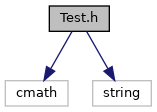#include <cmath>#include <string>
Include dependency graph for Test.h:

This graph shows which files directly or indirectly include this file:

Go to the source code of this file.
Classes | |
| class | Test |
Macros | |
| #define | CHECK(condition) |
| #define | CHECK_EQUAL(expected, actual) { if ((expected) == (actual)) return; result_.addFailure(Failure(name_, __FILE__, __LINE__, std::to_string(expected), std::to_string(actual))); } |
| #define | CHECK_EXCEPTION(condition, exception_name) |
| #define | DOUBLES_EQUAL(expected, actual, threshold) |
| #define | EQUALITY(expected, actual) |
| #define | EXPECT(condition) |
| #define | EXPECT_DOUBLES_EQUAL(expected, actual, threshold) |
| #define | EXPECT_LONGS_EQUAL(expected, actual) |
| #define | FAIL(text) { result_.addFailure (Failure (name_, __FILE__, __LINE__,(text))); return; } |
| #define | FRIEND_TEST(testGroup, testName) friend class testGroup##testName##Test; |
| #define | LONGS_EQUAL(expected, actual) |
| #define | TEST(testGroup, testName) |
| #define | TEST_DISABLED(testGroup, testName) void testGroup##testName##Test(TestResult& result_, const std::string& name_) |
| #define | TEST_UNSAFE(testGroup, testName) |
| #define | THROWS_EXCEPTION(condition) |
Macro Definition Documentation
◆ CHECK
| #define CHECK | ( | condition | ) |
Value:
{ if (!(condition)) \
{ result_.addFailure (Failure (name_, __FILE__,__LINE__, #condition)); return; } }
Definition: Failure.h:28
◆ CHECK_EQUAL
◆ CHECK_EXCEPTION
| #define CHECK_EXCEPTION | ( | condition, | |
| exception_name | |||
| ) |
Value:
{ try { condition; \
result_.addFailure (Failure (name_, __FILE__,__LINE__, std::string("Didn't throw: ") + std::string(#condition))); \
return; } \
catch (exception_name&) {} \
catch (...) { \
result_.addFailure (Failure (name_, __FILE__,__LINE__, std::string("Wrong exception: ") + std::string(#condition) + std::string(", expected: ") + std::string(#exception_name))); \
return; } }
Definition: Failure.h:28
◆ DOUBLES_EQUAL
| #define DOUBLES_EQUAL | ( | expected, | |
| actual, | |||
| threshold | |||
| ) |
Value:
{ double actualTemp = actual; \
double expectedTemp = expected; \
if (!std::isfinite(actualTemp) || !std::isfinite(expectedTemp) || fabs ((expectedTemp)-(actualTemp)) > threshold) \
{ result_.addFailure (Failure (name_, __FILE__, __LINE__, \
std::to_string((double)expectedTemp), std::to_string((double)actualTemp))); return; } }
Definition: Failure.h:28
◆ EQUALITY
| #define EQUALITY | ( | expected, | |
| actual | |||
| ) |
Value:
bool assert_equal(const Matrix &expected, const Matrix &actual, double tol)
Definition: Matrix.cpp:40
Definition: Failure.h:28
◆ EXPECT
| #define EXPECT | ( | condition | ) |
Value:
{ if (!(condition)) \
{ result_.addFailure (Failure (name_, __FILE__,__LINE__, #condition)); } }
Definition: Failure.h:28
◆ EXPECT_DOUBLES_EQUAL
| #define EXPECT_DOUBLES_EQUAL | ( | expected, | |
| actual, | |||
| threshold | |||
| ) |
Value:
{ double actualTemp = actual; \
double expectedTemp = expected; \
if (!std::isfinite(actualTemp) || !std::isfinite(expectedTemp) || fabs ((expectedTemp)-(actualTemp)) > threshold) \
{ result_.addFailure (Failure (name_, __FILE__, __LINE__, \
std::to_string((double)expectedTemp), std::to_string((double)actualTemp))); } }
Definition: Failure.h:28
◆ EXPECT_LONGS_EQUAL
| #define EXPECT_LONGS_EQUAL | ( | expected, | |
| actual | |||
| ) |
Value:
{ long actualTemp = actual; \
long expectedTemp = expected; \
if ((expectedTemp) != (actualTemp)) \
{ result_.addFailure (Failure (name_, __FILE__, __LINE__, std::to_string(expectedTemp), \
std::to_string(actualTemp))); } }
Definition: Failure.h:28
◆ FAIL
◆ FRIEND_TEST
| #define FRIEND_TEST | ( | testGroup, | |
| testName | |||
| ) | friend class testGroup##testName##Test; |
◆ LONGS_EQUAL
| #define LONGS_EQUAL | ( | expected, | |
| actual | |||
| ) |
Value:
{ long actualTemp = actual; \
long expectedTemp = expected; \
if ((expectedTemp) != (actualTemp)) \
{ result_.addFailure (Failure (name_, __FILE__, __LINE__, std::to_string(expectedTemp), \
std::to_string(actualTemp))); return; } }
Definition: Failure.h:28
◆ TEST
| #define TEST | ( | testGroup, | |
| testName | |||
| ) |
Value:
testGroup##testName##Instance; \
void testGroup##testName##Test::run (TestResult& result_)
virtual void run(TestResult &result)=0
Definition: TestResult.h:26
Normal test will wrap execution in a try/catch block to catch exceptions more effectively
◆ TEST_DISABLED
| #define TEST_DISABLED | ( | testGroup, | |
| testName | |||
| ) | void testGroup##testName##Test(TestResult& result_, const std::string& name_) |
◆ TEST_UNSAFE
| #define TEST_UNSAFE | ( | testGroup, | |
| testName | |||
| ) |
Value:
virtual ~testGroup##testName##Test () {} \
testGroup##testName##Instance; \
void testGroup##testName##Test::run (TestResult& result_)
virtual void run(TestResult &result)=0
Definition: TestResult.h:26
For debugging only: use TEST_UNSAFE to allow debuggers to have access to exceptions, as this will not wrap execution with a try/catch block
◆ THROWS_EXCEPTION
| #define THROWS_EXCEPTION | ( | condition | ) |
Value:
{ try { condition; \
result_.addFailure (Failure (name_, __FILE__,__LINE__, std::string("Didn't throw: ") + std::string(#condition))); \
return; } \
catch (...) {} }
Definition: Failure.h:28